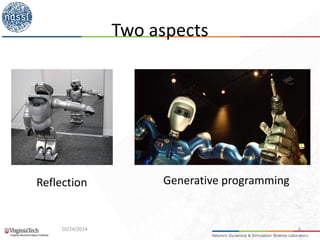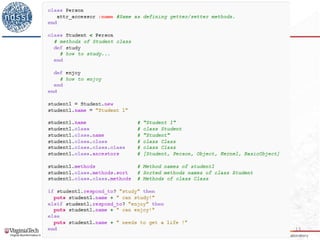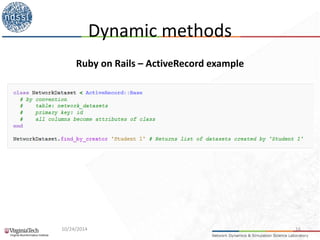Exploring metaprogramming using Ruby language
- 1. Exploring metaprogramming using Ruby language A brief introduction Harshal Ganpatrao Hayatnagarkar PhD Candidate in Dept. of Computer Science 1 Friday, October 3, 2014
- 2. Engineering marvels Ford Model T (approx. 1918) Tesla Model S (2010) 10/24/2014 2
- 3. Assembly Lines: Process marvels Ford Model T Assembly Line Tesla Robotic Assembly Line 10/24/2014 3
- 4. Assembly Lines: Process marvels People building cars A worker on assembly line does same task repetitively, item after item and day after day. People building robots building cars Is this like programming? People building robots build robots building cars What is this analogous to? Courtesy: http://stackoverflow.com/questions/3468246/whats-the-use-of-metaprogramming 10/24/2014 4
- 5. Metaphor ŌĆ” People building robots building robotsŌĆ” building cars What is this analogous to? 10/24/2014 5
- 6. Meta-programming ŌĆó Meta (ŌĆśbeyondŌĆÖ in Greek) + programming ’āĀ Programming Abstraction ŌĆō Similar to meta-data, meta-model, meta-physics and so on. ŌĆó ŌĆ£Writing of computer programs that with ability to treat programs as their data, as it meant that a program could be designed to read, generate, analyse and/or transform other programs, and even modify itself while running. In some cases, this allows programmers to minimize the number of lines of code to express a solution (hence reducing development time), or it gives programs greater flexibility to efficiently handle new situations without recompilation.ŌĆØ - Wikipedia 10/24/2014 6
- 7. Revelation Data-Code Duality 10/24/2014 7
- 8. Two aspects Reflection Generative programming 10/24/2014 8
- 9. Reflection ŌĆó Ability of a computer program to examine and modify the structure and behavior (specifically values, meta-data, properties and functions) of the program at runtime. ŌĆō Metalanguage in which metaprogram is written. ŌĆō object language, programs written in which are manipulated. ŌĆō reflection or reflexivity is ability of a programming language to be its own metalanguage. ŌĆó Fairly common in programming languages ŌĆō C++ (limited) ŌĆō Java (+ other JVM languages), C# (+ other CLR languages) ŌĆō JavaScript, Python, PHP, Ruby 10/24/2014 9
- 10. Generative Programming ŌĆó ŌĆ£A style of computer programming that uses automated source code creation through generic frames, classes, prototypes, templates, aspects, and code generators to improve programmer productivity.ŌĆØ - Wikipedia ŌĆó For example, ŌĆō Internal to language: C/C++ preprocessor macros, C++ templates, LISP macros, Ruby/Python/PHP evaluations. ŌĆō External: Code generation templates. 10/24/2014 10
- 11. Ruby Programming Language ŌĆó Dynamic, reflective, object-oriented, general-purpose programming language. ŌĆó Influenced by Perl, Smalltalk, Eiffel, Ada, and Lisp. ŌĆó Supports multiple paradigms functional, object-oriented, and imperative. ŌĆó With dynamic type system and automatic memory management. Yukihiro "Matz" Matsumoto 10/24/2014 11
- 12. Meta Object Protocol ŌĆó Everything is an object, including classes. ŌĆó Method calling is analogous to message passing where arguments are payload. 10/24/2014 12
- 13. 10/24/2014 13
- 14. Open Classes 10/24/2014 14
- 15. Dynamic methods 10/24/2014 15
- 16. Dynamic methods Ruby on Rails ŌĆō ActiveRecord example 10/24/2014 16
- 17. Generative Programming ŌĆó Code generation ŌĆō one or more levels ŌĆō ŌĆśevalŌĆÖ expression family ŌĆō Takes source code in string form and embed in current context. 10/24/2014 17
- 18. Two-level generation ŌĆó Code generating code generating code Level 1 Level 2 ’āĀ ŌĆśLevel 1ŌĆÖ eval ’āĀ ŌĆśLevel 2ŌĆÖ eval 10/24/2014 18
- 19. Pitfalls ŌĆó Metabugs? ŌĆō Bugs generating bugs generatingŌĆ” ŌĆō And there is no ŌĆśprograms debugging programs debugging programsŌĆ”ŌĆÖ. ŌĆó Increased code complexity 10/24/2014 19
- 20. Further explorationŌĆ” ŌĆó Model-driven development ŌĆó Domain-specific languages ŌĆó Ruby on Rails for web development framework ŌĆō An example of metaprogramming features. 10/24/2014 20
- 21. Questions? And thank you for your interest ! 10/24/2014 21
Editor's Notes
- #6: This metaphor can explain metaphor in two ways: Robots building robotsŌĆ” Self-aware robots (autonomic computing)
- #9: 1. Reflection: Recalling the example of self-aware robots, if a robot can inspect itself for faults and optimization, it is wonderful. Such a capability requires many features in the robotic system, which could be provided by reflection.
- #10: In many languages such as C/C++, once code is generated, the information about types and variables is lost after compilation (only exception is RTTI where name of type is retained at runtime). However, the





















